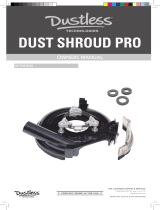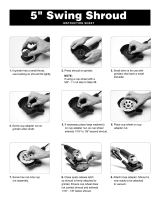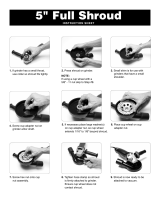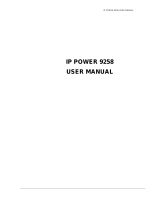Page is loading ...

If you have questions or comments, contact us.
Pour toute question ou tout commentaire, nous contacter.
Si tiene dudas o comentarios, contactenos.
INSTRUCTION MANUAL
GUIDE D'UTILISATION
MANUAL DE INSTRUCCIONES
INSTRUCTIVO DE OPERACION, CENTROS DE SERVICIO Y POLIZA DE
GARANT[A. ADVERTENOIA: LEASE ESTE INSTRUCTIVO ANTES DE
USAR EL PRODUCTO.
®
DWE46150
5" (127 mm) Concrete Surface Grinding Shroud
5" (127 mm) Carter d'aspiration pour meuleuses de finition du b_ton
5" (127 mm) Cubierta protectora para esmerilado de superficies de concreto

Definitions: Safety Guidelines
The definitions below describe the level of severity
for each signal word. Please read the manual and pay attention
to these symbols.
ADANGER: Indicates an imminently hazardous situation
which, if not avoided, will result in death or serious injury.
AWARNING: Indicates a potentially hazardous situation which,
if not avoided, could result in death or serious injury.
ACAUTION: Indicates apotentially hazardous situation which,
if not avoided, may result in minor or moderate injury.
NOTICE: Indicates a practice not related to personal injury
X. which, if not avoided, may result in property damage.
J
IF YOU HAVE ANY QUESTIONS OR COMMENTS ABOUT THIS OR
ANY DEWALT TOOL, CALL US TOLL FREE AT: 1-800-4-DEWALT
(1-800-433-9258}.
_ ARNING: To reduce the risk of injury, read the instruction
manual.
SAVE ALL WARNINGS AND INSTRUCTIONS
FOR FUTURE REFERENCE
General Safety Warnings
_ WARNING: For your own safety, read the instruction manual for
both the grinder tool and the dust extractor vacuum before using
any accessory, Failure to heed these warnings may result in personal
injury and serious damage to the tool and the accessory, When
servicing this tool, use only identical replacement parts.
1) WORK AREA SAFETY
a) Keep work area clean and well lit. Cluttered or dark areas
invite accidents.
b) Keep children and bystanders away while operating a
power tool. Distractions can cause you to lose control
c) Ensure the workplace is well ventilated. Exposure to dust
at a poorly ventilated workplace may result in damage to the
health.
2) ELECTRICAL SAFETY
a) Avoid body contact with earthed or grounded surfaces
such as pipes, radiators, ranges and refrigerators. There
is an increased risk of electric shock if your body is earthed or
grounded.
3) PERSONAL SAFETY
a) Stay alert, watch what you are doing and use common
sense when operating a power tool. Do not use a
power tool while you are tired or under the influence of
drugs, alcohol or medication. A moment of inattention while
operating power tools may result in serious personal injury,
b) Use personal protective equipment. Always wear eye
protection. Protective equipment such as dust mask, non-
skid safety shoes, hard hat, or hearing protection used for
appropriate conditions will reduce personal injuries.
c) Do not overreach. Keep proper footing and balance at
all times. This enables better control of the power tool in
unexpected situations.
d) Dress properly. Do not wear loose clothing or jewelry.
Keep your hair, clothing and gloves away from moving
parts. Loose clothes, jewelry or long hair can be caught in
moving parts.

4) POWER TOOL USE AND CARE
a) Do not force the power tool Use the correct power tool
for your application. The correct power tool will do the job
better and safer at the rate for which it was designed.
_WAFtNING: The use of any accessory or attachment or
performance of any operation with this tool, other than those
recommended in this instruction manual may present a risk of
personal injury.
b) Store idle power tools out of the reach of children and do
not allow persons unfamiliar with the power tool or these
instructions to operate the power tool Power tools are
dangerous in the hands of untrained users.
c) Use the power tool, accessories and tool bits etc., in
accordance with these instructions taking into account
the working conditions and the work to be performed.
Use of the power tool for operations different from those
intended could result in a hazardous situation.
5) SERVICE
a) Have your power tool serviced by a qualified repair
person using only identical replacement parts. This will
ensure that the safety of the power tool is maintained.
Surface Grinding Shroud Safety Rules
• The shroud must be securely attached to the power tool
and positioned for maximum safety, so the least amount
of wheel is exposed towards the operator. The shroud is
designed to collect dust and help protect the operator from
accidental contact with the wheel
• Do not use accessories which are not specifically designed
and recommended by the tool manufacturer. Just because
the accessory can be attached to your power tool, it does not
assure safe operation.
• Only use dry diamond surface cup wheels with this surface
grinding shroud. The surface grinding shroud is not intended
to be used with standard grinding, cut-off, cup wheels or wire
brushes.
• The rated speed of the accessory must be at least equal to
the maximum speed marked on the power tool Accessories
running faster than their rated speed can break and fly apart.
• Hold power tool by insulated gripping surfaces only, when
performing an operation where the cutting accessory may
contact hidden wiring or its own cord. Cutting accessory
contacting a "live" wire may make exposed metal parts of the
power tool "live" and shock the operator.
• Always use side handle. Tighten the handle securely. The
side handle should always be used to maintain control of the tool
at all times.
• Do not use a damaged accessory. Before each use inspect
the accessory such as diamond wheel for chips and cracks,
backing pad for cracks and tear or excess wear. If power
tool or accessory is dropped, inspect for damage or install
an undamaged accessory. After inspecting and installing
an accessory, position yourself and bystanders away from
the plane of the rotating accessory and run the power
tool at maximum no-load speed for one minute. Damaged
accessories will normally break apart during this test time.
• When starting the tool with a new or replacement wheel,
hold the tool in a well protected area and let it run for one
minute. If the wheel has an undetected crack or flaw, it should
burst in less than one minute. Never start the tool with a person in
line with the wheel This includes the operator.
• Wear personal protective equipment. Depending on
application, use face shield, safety goggles or safety glasses.

Asappropriate,weardustmask,hearingprotectors,gloves
andworkshopaproncapableofstopping small abrasive or
workpiece fragments. The eye protection must be capable of
stopping flying debris generated by various operations. The dust
mask or respirator must be capable of filtrating particles generated
by your operation. Prolonged exposure to high intensity noise may
cause hearing loss.
• Position the cord clear of the spinning accessory. If you lose
control, the cord may be cut or snagged and your hand or arm may
be pulled into the spinning accessory.
• Never lay the power tool down until the accessory has come
to a complete stop. The spinning accessory may grab the surface
and pull the power tool out of your control
• Do not run the power tool while carrying it at your side.
Accidental contact with the spinning accessory could snag your
clothing, pulling the accessory into your body.
• Regularly clean the power tool's air vents. The motor's fan will
draw the dust inside the housing and excessive accumulation of
powdered metal may cause electrical hazards.
• Do not operate the power tool near flammable materials.
Sparks could ignite these materials.
• Do not use accessories that require liquid coolants. Using
water or other liquid coolants may result in electrocution or shock.
• DO NOT use wire brushes with this surface grinding shroud.
• DO NOT use abrasive wheels.
• DO NOT grind or cut metal with a diamond cup wheel.
Fragments could loosen and fly apart.
• ALWAYS use with a dust collector.
_ WARNING: When not in use, place grinder on a stable surface
where ff will not move inadvertantly, roll or cause a tripping or
falling hazard. Serious personal injury may result.
_WARNING: ALWAYS use safety glasses. Everyday eyeglasses are
NOT safety glasses. Also use face or dust mask if cutting operation is
dusty. ALWAYS wear certified safety equipment:
• ANSI Z87.1 eye protection (CAN/CSA Z94.3).
• ANSI $12.6 ($3.19) hearing protection.
• NIOSH/OSHA respiratory protection.
_, WARNING: Some dust created by power sanding, sawing, grinding,
drilling, and other construction activities contains chemicals known to
the State of California to cause cancer, birth defects or other
reproductive harm. Some examples of these chemicals are:
• lead from lead-based paints,
• crystalline silica from bricks and cement and other masonry
products, and
• arsenic and chromium from chemically-treated lumber.
Yourrisk from these exposures varies, depending on how often you do
this type of work. To reduce your exposure to these chemicals: work
in a well ventilated area, and work with approved safety equipment,
such as those dust masks that are specially designed to filter out
microscopic particles.
• Avoid prolonged contact with dust from power sanding,
sawing, grinding, drilling, and other construction activities.
Wear protective clothing and wash exposed areas with soap
and water. Allowing dust to get into your mouth, eyes, or lay on
the skin may promote absorption of harmful chemicals.
AWARNING: Use of this tool can generate and/or disburse dust,
which may cause serious and permanent respiratory or other injury.
Always use NIOSH/OSHA approved respiratory protection appropriate
for the dust exposure. Direct particles away from face and body.
_WARNING: Before beginning the work, check to determine
the hazard classification of the dust produced. Use an industrial
dust extractor vacuum of the appropriate, officially approved

safetyclassthatisincompliancewithyourlocaldusthazard
controlregulations.
_WARNING: Always wear proper personal hearing protection.
Under some conditions and duration of use, noise from this product
may contribute to hearing loss.
SAVE ALL WARNINGS AND INSTRUCTIONS
FOR FUTURE REFERENCE
COMPONENTS (FIG. 1)
A WARNING: Never modify the power tool or any part of it. Damage
or personal injury could result.
A. Dust port E. Edging door
B. Clamp adjusting screw F. Edging door tab
C. Replaceable brush skirt G. Clamping lever
D. Brush skirt removal hole
FIG. 1
A
E
D
C
INTENDED USE
Your concrete surface grinding shroud has been designed for dust
removal of the following: grinding, leveling and polishing concrete
surfaces. It can remove dust when removing surface paint, epoxy
and glue. Using the appropriate grinder, diamond grinding wheel and
dust extractor vacuum it can be used to remove the vast majority of
static and airborne dust which without the use of the surface grinding
shroud could otherwise contaminate the working environment or pose
an increased health risk to the operator and those in close proximity.
This concrete surface grinder should ALWAYS be used with a dust
extractor vacuum designed for concrete dust removal.
DO NOT use under wet conditions or in presence of flammable liquids
or gases.
The surface grinding shroud is a professional tool. DO NOT let
children come into contact with the tool. Supervision is required when
inexperienced operators use this tool.
Recommended power tools to be used with this attachment are
available at extra cost from your local dealer or authorized service
center. If you need assistance in locating any power tool, please
contact DEWALT Industrial Tool Co., 701 East Joppa Road, Baltimore,
MD 21286, call 1-800-4-DEWALT (1-800-433-9258) or visit our
website www.dewalt.com.
ASSEMBLY (FIG. 1, 2)
AWARNING: To reduce the risk of injury, ALWAYS turn off the
tool and disconnect the tool from the power source before
making any adjustments or removing or installing attachments
or accessories. This applies to both the grinder and the dust
extractor vacuum. Such preventative safety measures reduce the
risk of starting the tool accidentally.

Mounting and Removing Surface Grinding
Shroud
1. Follow the mounting and removing guard instructions in tool
manual to remove the guard from grinder.
2. Open the clamp lever (G)on the surface grinding shroud and align
the tabs (H) on the surface grinding shroud with the slots (I)on the
grinder gear case.
3. With the clamp lever open, rotate the shroud into the desired
working position. The surface grinding shroud should be
positioned between the spindle and the operator to provide
operator protection.
FIG.2
G
4. Close the clamp lever to secure the surface grinding shroud on the
gear case. Tighten the clamp adjusting screw (B)to ensure shroud
is secured to gear case.
For optimal positioning, the diamond wheel should ride above the
brushes 1/8" (3.18 mm). If diamond wheel rides inside the shroud
or stands taller than 1/4" (6.35 mm) the shroud will not work
properly.
NOTICE: Do not tighten the clamp adjusting screw (B)with the clamp
lever in open position. Undetectable damage to the surface grinding
shroud or the mounting hub may result.
NOTICE: If surface grinding shroud cannot be tightened by the clamp
adjusting screw, do not use the tool and take the tool and surface
grinding shroud to a service center to repair or replace the surface
grinding shroud.
5. To remove the surface grinding shroud, open the clamp lever,
rotate the surface grinding shroud to align the slots and tabs and
pull up on the surface grinding shroud.
Mounting Dry Diamond
Surface Cup Wheels
(Fig. 3)
Follow the mounting and using cutting
wheels instructions in the tool manual
and mount the grinding wheel. DO NOT
use Type 1 cutting wheels or bonded
abrasive wheels.
Dry diamond surface cup (J) wheels are
recommended for use with this shroud.
The inner flange washer (K) should be
installed behind the wheel allowing free
tool removal and proper fit.
Dust Extraction
(Fig. 1, 4)
FIG. 3
WARNING: Use only power tools recommended by DEWALT with
this attachment.
For more information about DEWALT power tools compatible with this
attachment, please contact your local dealer, call 1-800-4-DEWALT
(1-800-433-9258) or visit our website www.dewalt.com.

,_ WARNING: This attachment MUST BE used with a dust extractor
system. ALWAYS wear certified safety face or dust mask.
NOTE: Ensure hose connection is secure.
NOTE: The amount of dust retained by the dust extractor vacuum
is dependent on its filter system. Refer to the dust extractor vacuum
instruction manual for more information.
All DEWALT dust collection shrouds are designed to work with the
DEWALTuniversal DWV9000 connector.
1. Attach the DWV9000 connector (L)to your dust collector hose (K).
2. Unlock the DWV9000 connector (L) and slide onto dust port (A).
3. Lock the DWV9000 connector (L)to secure.
TRADITIONAL DUST EXTRACTOR VACUUM HOSES
Attach recommended dust extractor vacuum hose to dust port (A).
OPERATION
_WARNING: To reduce the risk of injury, ALWAYS turn off
tool and disconnect the tool from the power source before
making any adjustments or removing or installing attachments
or accessories. This applies to both the grinder and the dust
extractor vacuum. Such preventative safety measures reduce the
risk of starting the tool accidentally.
A WARNING: For your own safety, read the instruction manual for
both the grinding tool and the dust extractor vacuum before using any
accessory. Failure to heed these warnings may result in personal injury
and serious damage to the tool and the accessory. When servicing this
tool, use only identical replacement parts.
NOTE: The amount of dust retained by the dust extractor vacuum
is dependent on its filter system. Refer to the dust extractor vacuum
instruction manual for more information.
1. Ensure all assembly instructions have been completed.
2. Turn the dust extractor vacuum on as instructed in the dust
extractor vacuum instruction manual.
3. Turn the tool on as instructed in the tool instruction manual and
allow it to reach full speed before making contact with work
surface.
4. Place the surface grinding shroud to flat work surface such as a
floor or wall and begin grinding.
5. When surface grinding iscomplete, turn the tool off and disconnect
from the power source. Allow the tool to stop rotating before laying
it down.
NOTE: The surface grinding shroud and dust extractor vacuum will
only be effective when used with a diamond surface cup wheel on a
flat surface.

Edging Use Application (Fig. 1)
This concrete grinding shroud has a door feature to allow flush
grinding against a wall.
1. Turn off the tool and disconnect from the power source.
2. Using the edging door tab (C), rotate the edging door until it snaps
into the open postion.
3. Connect the tool to the power source.
4. Position hands and body away from wheel and door opening.
5. Place the door edge flush to work surface, turn the tool on and
begin grinding. Remove the tool from work surface before turning
the tool off.
7. When flush grinding is complete, turn off the tool and disconnect
from power source. Allow the tool to stop rotating before laying it
down.
8. Using the edging door tab (C), rotate door until it snaps into the
closed position.
MAINTENANCE
,&WARNING." To reduce the risk of injury, ALWAYS turn off
tool and disconnect the tool from the power source before
making any adjustments or removing or installing attachments
or accessories. This applies to both the grinder and the dust
extractor vacuum. Such preventative safety measures reduce the
risk of starting the tool accidentally,
Replace Brush Skirt (Fig. 1)
1. Turn off the tool and disconnect from power source.
2. Push worn brush skirt from brush skirt removal holes (D).
3. Press new brush skirt into brush skirt removal holes until secure.
Replacement brush skirts are available at extra cost from your local
dealer or authorized service center. Ifyou need assistance in locating
any accessory, please contact DEWALT Industrial Tool Co., 701 East
Joppa Road, Baltimore, MD 21286, call 1-800-4-DEWALT (1-800-
433-9258) or visit our website: www.dewalt.com.
Cleaning
_, WARNING: Blow dirt and dust out of all air vents with clean, dry air
at least once a week. Tominimize the risk of eye injury, always wear
ANSI Z87.1 approved eye protection when performing this.
,&WARNING: Never use solvents or other harsh chemicals for cleaning
the non-metallic parts of the tool These chemicals may weaken the
plastic materials used in these parts. Use a cloth dampened only with
water and mild soap. Never let any liquid get inside the tool," never
immerse any part of the tool into a liquid.
Accessories
A WARNING: Since accessories, other than those offered by DEWALT,
have not been tested with this product, use of such accessories with
this tool could be hazardous. Toreduce the risk of injury,only DEWALT
recommended accessories should be used with this product.
Recommended accessories for use with your tool are available at
extra cost from your local dealer or authorized service center. If you
need assistance in locating any accessory, please contact DEWALT
Industrial Tool Co., 701 East Joppa Road, Baltimore, MD 21286, call
1-800-4-DEWALT (1-800-433-9258) or visit our website: www.dewalt.
com.
Repairs
Toassure product SAFETY and RELIABILITY,repairs, maintenance and
adjustment (including brush inspection and replacement) should be
performed by a DEWALT factory service center, a DEWALTauthorized
service center or other qualified service personnel. Always use
identical replacement parts.

Three Year Limited Warranty
DEWALTwill repair,without charge, any defects due to faulty materials
or workmanship for three years from the date of purchase. This
warranty does not cover part failure due to normal wear or tool abuse.
For further detail of warranty coverage and warranty repair information,
visit www.dewalt.com or call 1-800-4-DEWALT (1-800-433-9258).
This warranty does not apply to accessories or damage caused where
repairs have been made or attempted by others. This warranty gives
you specific legal rights and you may have other rights which vary in
certain states or provinces.
In addition to the warranty, DEWALTtools are covered by our:
1 YEAR FREE SERVICE
DEWALT will maintain the tool and replace worn parts caused by
normal use, for free, any time during the first year after purchase.
90 DAY MONEY BACK GUARANTEE
If you are not completely satisfied with the performance of your
DE-:WALTPower Tool, Laser, or Nailer for any reason, you can return it
within 90 days from the date of purchase with a receipt for a full refund
- no questions asked.
LATIN AMERICA" This warranty does not apply to products sold
in Latin America. For products sold in Latin America, see country
specific warranty information contained in the packaging, call the local
company or see website for warranty information.
FREE WARNING LABEL REPLACEMENT: If your warning labels
become illegible or are missing, call 1-800-4-DEWALT (1-800-433-
9258) for a free replacement.

DEWALTIndustrial Tool Co., 701 East Joppa Road, Baltimore, MD 21286
(MAY12) Part No. N186888 DWE46150 Copyright © 2012 DEWALT
The following are trademarks for one or more DEWALTpower tools: the yellow and black color scheme; the "D" shaped air intake grill; the array
of pyramids on the handgrip; the kit box configuration; and the array of lozenge-shaped humps on the surface of the tool.
/




